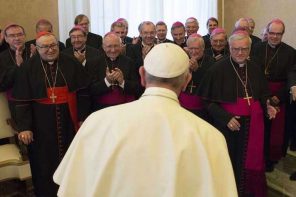As a theologian, I sometimes wonder if anyone cares about what we write. But Newsweek’s cover story (December 15, 2008), “Our Mutual Joy,” set off a firestorm of responses so voluminous that it temporarily shut down the magazine’s comments function on their Web site. Time’s “Person of the Year” issue would be lucky to get as much attention as the enormous response to a religion editor’s pro-gay marriage piece. Apparently, religion still matters.
What does it mean, though, that this story has generated such controversy? The most obvious point is that people still care what religions say about matters of sexuality, for reasons that sometimes remain obscure. I doubt that the same reaction, and surely not the same huge numbers and rabid intensity, would have accompanied a progressive religious treatment of the war in Iraq or the death penalty. So why same-sex marriage? Why the private sphere and not the public forum?
One reason is that as Christianity has lost its hegemony in an increasingly religiously pluralistic society, Christian conservatives have staked their shrinking claims on changing personal ethics. First abortion, now same-sex marriage, and soon, end-of-life issues, are seen as litmus tests of orthodoxy. These issues define who’s in or out and, more importantly, who’s making decisions for a society.
The Rev. Richard Cizik, vice president of governmental affairs for the National Association of Evangelicals, has learned this the hard way lately. He has been urging his (kicking and screaming) colleagues to acknowledge global warming and join him in “creation care.” They tolerated him even as they denied the scientific consensus because they mistakenly took ecology to be a larger-than-life issue that did not touch the daily lives of people.
But when he voiced tepid support, not for marriage, but simply for civil unions for same-sex couples, he was forced out of his position. Marriage is closer to home. That straw broke the camel’s back because the issue is easier for people to grasp—and is thus where religious authorities could seem to be wielding real social power. Which is an illusion, after all, since global warming touches a lot more people than same sex marriage.
But religions traffic in illusions and this one works.
Ignoring the Experts
The orchestrated response to the Newsweek piece shows that the theo-political focus has shifted from abortion to same-sex marriage. In recent years, only abortion could have caused this kind of seismic reaction, but there is little new to say on that topic. The lines are clear, the laws are clear, at least for now. Abortion-related ballot initiatives in South Dakota, Colorado, and California all failed in November 2008.
By contrast, Mormon, Catholic, and other religious right groups funded and canvassed for Proposition 8 in California, and won.
The marriage struggle has just begun. But in these dismal economic times, not even the most deep-pocketed conservative groups can afford to wage culture wars on too many fronts. I predict that the end of life issues, foreshadowed by the Schiavo case, will emerge as soon as more “progress” is made staving off same-sex marriage. What is at stake in these so-called “private” issues is who has the power to shape the social consensus. If the conservatives win, they please their stock/stake holders and remain in business. If they don’t, they may go the way of other businesses that have lost market share.
The substance of Lisa Miller’s piece reveals that scholarship about religion and what most people know about religion are vastly different things. While not claiming to be a theologian, she cited a few sources and quoted a few people (for example, James Martin, Arthur Waskow, Walter Brueggemann) that point in a progressive direction.
But I kept expecting her to refer to the foundational work of Marvin Ellison, a Protestant ethicist whose work Same-Sex Marriage?: A Christian Ethical Analysis (The Pilgrim Press 2004) offers a thorough and critical look at the question. I thought she might reference Catholic historian Mark D. Jordan’s Authorizing Marriage?: Canon, Tradition, and Critique in the Blessing of Same-Sex Unions (Princeton 2006) with its careful approach to sources and texts. I figured she would conclude by sending her readers to a very useful Web site on the topic, developed by the Marriage Project of the Center for Lesbians and Gay Studies at the Pacific School of Religion at the Graduate Theological Union in Berkeley.
Alas, such substantive materials—and many more by authors including Irene Monroe, Judith Plaskow and myself—are all out there for the reading. Obviously they are not getting read by more than a small circle of academics. We have work to do to spread the good news of queer scholarship. I doubt that Newsweek regularly sends a correspondent to the American Academy of Religion or the Society of Biblical Literature’s annual meetings. The AAR actually has Religionsource, a searchable online database of experts available to the press on a variety of religious issues. Nonetheless, the gap between scholarship and general knowledge remains wide, especially on issues of same-sex love.
What Lisa Miller articulated in her piece was at best a primer on the issues. One can only imagine the reaction had she cited Bernadette Brooten’s Love Between Women: Early Christian Responses to Female Homoeroticism (University of Chicago Press, 1996) in which the author argues that the taboos in the early Christian communities on female-female sex had more to do with transgressing the usual “power over” model of male-female and male-male sex. Sex between equals would have crashed the Newsweek site in an instant! Or what if she had looked at the work of some gay male theologians who argue for the goodness of anal sex? Perhaps the whole Internet would have come crashing to a halt!
John McNeill’s new book, Sex as God Intended and Virginia Ramey Mollenkott’s newly reissued Sensuous Spirituality come readily to mind as foundational works by serious, seasoned scholars who are well-grounded biblically. What scholar can be without The Queer Bible Commentary (edited by Deryn Guest, Robert E. Goss, Mona West and Thomas Bohache, SCM Press 2006) if s/he wants to comment on same-sex matters and the Bible? These works and dozens more are why Lisa Miller could make a solid case and upset the religious conservatives’ applecart.
Many scholars of religion have already moved on, satisfied that we have proved beyond a reasonable doubt (many unreasonable ones surely remain) that if anyone is going to get married same-sex couples are equally entitled to make the choice as mixed-sex couples. We have turned our attention to heterosexism as the fundamental religiously-endorsed form of oppression when it comes to sexuality. A multi-religious volume Heterosexism in Contemporary World Religion: Problem and Prospect (edited by Marvin M. Ellison and Judith Plaskow, Pilgrim Press, 2007) shows the widespread and collusive nature of the problem. It is not perhaps as glitzy a cover story, but seeing how heterosexism permeates many faith traditions is a more far-reaching and potentially more transformative approach than even the dreaded same-sex marriage.
Watch out Newsweek readers. You have not seen anything yet. Get cracking religions scholars. You have readers out there you never imagined. Religion is big news.



